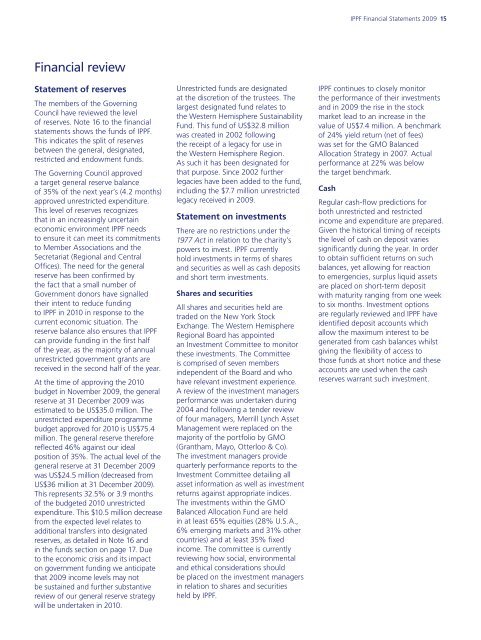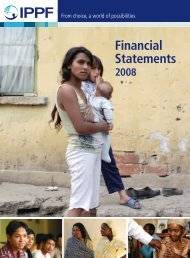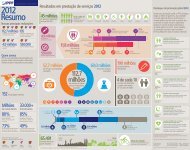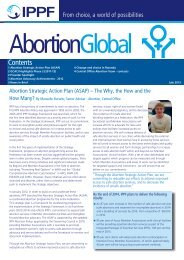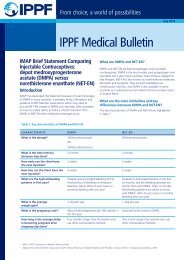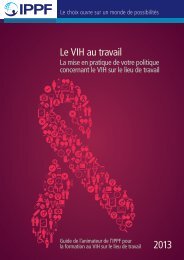Financial Statements - International Planned Parenthood Federation
Financial Statements - International Planned Parenthood Federation
Financial Statements - International Planned Parenthood Federation
Create successful ePaper yourself
Turn your PDF publications into a flip-book with our unique Google optimized e-Paper software.
IPPF <strong>Financial</strong> <strong>Statements</strong> 2009 15<br />
<strong>Financial</strong> review<br />
Statement of reserves<br />
The members of the Governing<br />
Council have reviewed the level<br />
of reserves. Note 16 to the financial<br />
statements shows the funds of IPPF.<br />
This indicates the split of reserves<br />
between the general, designated,<br />
restricted and endowment funds.<br />
The Governing Council approved<br />
a target general reserve balance<br />
of 35% of the next year’s (4.2 months)<br />
approved unrestricted expenditure.<br />
This level of reserves recognizes<br />
that in an increasingly uncertain<br />
economic environment IPPF needs<br />
to ensure it can meet its commitments<br />
to Member Associations and the<br />
Secretariat (Regional and Central<br />
Offices). The need for the general<br />
reserve has been confirmed by<br />
the fact that a small number of<br />
Government donors have signalled<br />
their intent to reduce funding<br />
to IPPF in 2010 in response to the<br />
current economic situation. The<br />
reserve balance also ensures that IPPF<br />
can provide funding in the first half<br />
of the year, as the majority of annual<br />
unrestricted government grants are<br />
received in the second half of the year.<br />
At the time of approving the 2010<br />
budget in November 2009, the general<br />
reserve at 31 December 2009 was<br />
estimated to be US$35.0 million. The<br />
unrestricted expenditure programme<br />
budget approved for 2010 is US$75.4<br />
million. The general reserve therefore<br />
reflected 46% against our ideal<br />
position of 35%. The actual level of the<br />
general reserve at 31 December 2009<br />
was US$24.5 million (decreased from<br />
US$36 million at 31 December 2009).<br />
This represents 32.5% or 3.9 months<br />
of the budgeted 2010 unrestricted<br />
expenditure. This $10.5 million decrease<br />
from the expected level relates to<br />
additional transfers into designated<br />
reserves, as detailed in Note 16 and<br />
in the funds section on page 17. Due<br />
to the economic crisis and its impact<br />
on government funding we anticipate<br />
that 2009 income levels may not<br />
be sustained and further substantive<br />
review of our general reserve strategy<br />
will be undertaken in 2010.<br />
Unrestricted funds are designated<br />
at the discretion of the trustees. The<br />
largest designated fund relates to<br />
the Western Hemisphere Sustainability<br />
Fund. This fund of US$32.8 million<br />
was created in 2002 following<br />
the receipt of a legacy for use in<br />
the Western Hemisphere Region.<br />
As such it has been designated for<br />
that purpose. Since 2002 further<br />
legacies have been added to the fund,<br />
including the $7.7 million unrestricted<br />
legacy received in 2009.<br />
Statement on investments<br />
There are no restrictions under the<br />
1977 Act in relation to the charity’s<br />
powers to invest. IPPF currently<br />
hold investments in terms of shares<br />
and securities as well as cash deposits<br />
and short term investments.<br />
Shares and securities<br />
All shares and securities held are<br />
traded on the New York Stock<br />
Exchange. The Western Hemisphere<br />
Regional Board has appointed<br />
an Investment Committee to monitor<br />
these investments. The Committee<br />
is comprised of seven members<br />
independent of the Board and who<br />
have relevant investment experience.<br />
A review of the investment managers<br />
performance was undertaken during<br />
2004 and following a tender review<br />
of four managers, Merrill Lynch Asset<br />
Management were replaced on the<br />
majority of the portfolio by GMO<br />
(Grantham, Mayo, Otterloo & Co).<br />
The investment managers provide<br />
quarterly performance reports to the<br />
Investment Committee detailing all<br />
asset information as well as investment<br />
returns against appropriate indices.<br />
The investments within the GMO<br />
Balanced Allocation Fund are held<br />
in at least 65% equities (28% U.S.A.,<br />
6% emerging markets and 31% other<br />
countries) and at least 35% fixed<br />
income. The committee is currently<br />
reviewing how social, environmental<br />
and ethical considerations should<br />
be placed on the investment managers<br />
in relation to shares and securities<br />
held by IPPF.<br />
IPPF continues to closely monitor<br />
the performance of their investments<br />
and in 2009 the rise in the stock<br />
market lead to an increase in the<br />
value of US$7.4 million. A benchmark<br />
of 24% yield return (net of fees)<br />
was set for the GMO Balanced<br />
Allocation Strategy in 2007. Actual<br />
performance at 22% was below<br />
the target benchmark.<br />
Cash<br />
Regular cash-flow predictions for<br />
both unrestricted and restricted<br />
income and expenditure are prepared.<br />
Given the historical timing of receipts<br />
the level of cash on deposit varies<br />
significantly during the year. In order<br />
to obtain sufficient returns on such<br />
balances, yet allowing for reaction<br />
to emergencies, surplus liquid assets<br />
are placed on short-term deposit<br />
with maturity ranging from one week<br />
to six months. Investment options<br />
are regularly reviewed and IPPF have<br />
identified deposit accounts which<br />
allow the maximum interest to be<br />
generated from cash balances whilst<br />
giving the flexibility of access to<br />
those funds at short notice and these<br />
accounts are used when the cash<br />
reserves warrant such investment.


